Health Promotion Strategies for African American Families
VerifiedAdded on 2022/08/18
|7
|1784
|244
Report
AI Summary
This report focuses on family-centered health promotion within African American communities, highlighting the significant health disparities and nutritional challenges faced by this minority group. It addresses cultural and socioeconomic barriers to healthcare access, including low health literacy and the impact of racial discrimination on chronic stress. The report also examines existing health promotion activities, such as those led by faith-based organizations, and proposes three levels of health promotion prevention: educational approaches, culturally competent care plans, and the application of the "theory of functionalism" to create stable and supportive community structures. The ultimate goal is to reduce health risks and improve overall well-being through tailored interventions and collaborative efforts.
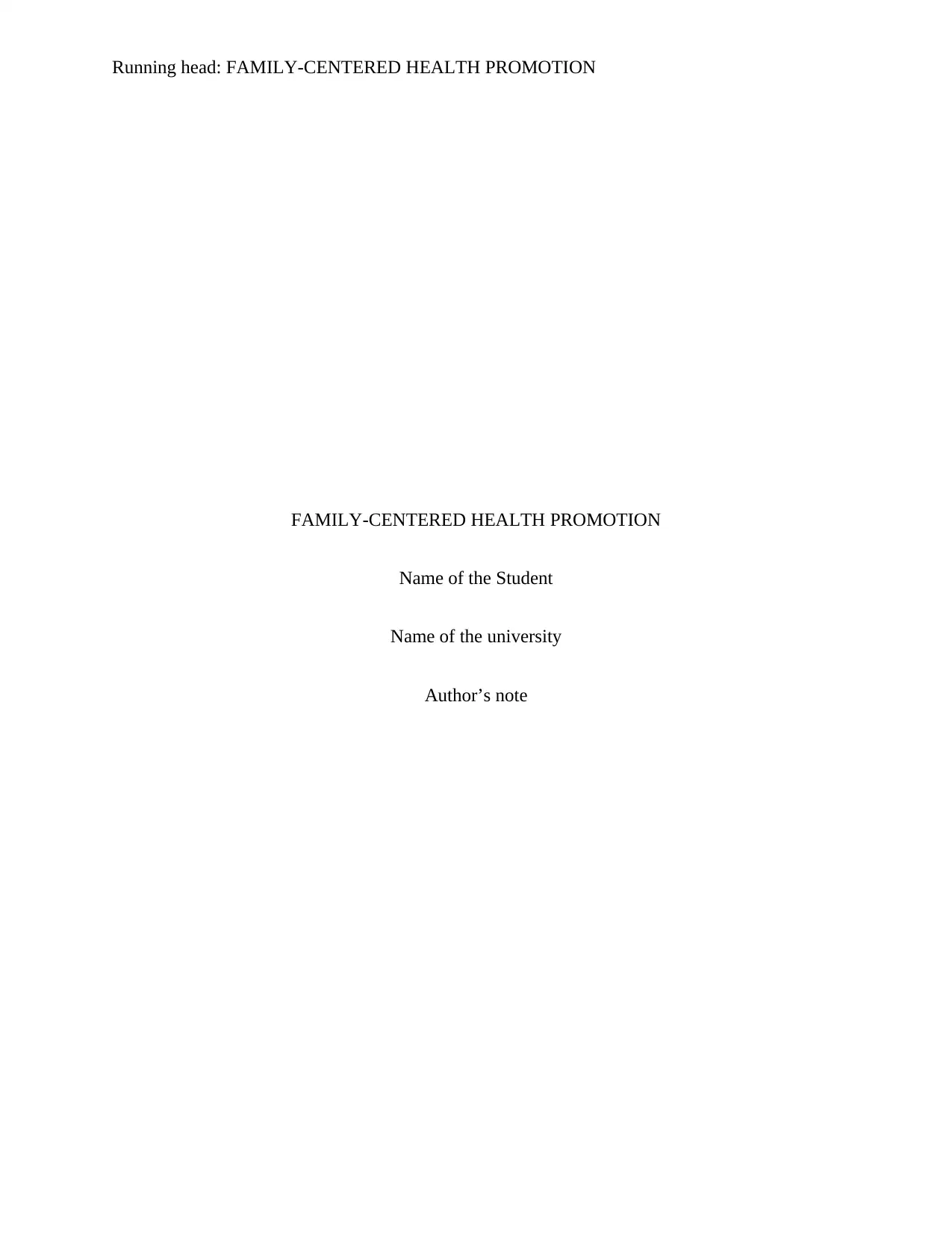
Running head: FAMILY-CENTERED HEALTH PROMOTION
FAMILY-CENTERED HEALTH PROMOTION
Name of the Student
Name of the university
Author’s note
FAMILY-CENTERED HEALTH PROMOTION
Name of the Student
Name of the university
Author’s note
Paraphrase This Document
Need a fresh take? Get an instant paraphrase of this document with our AI Paraphraser
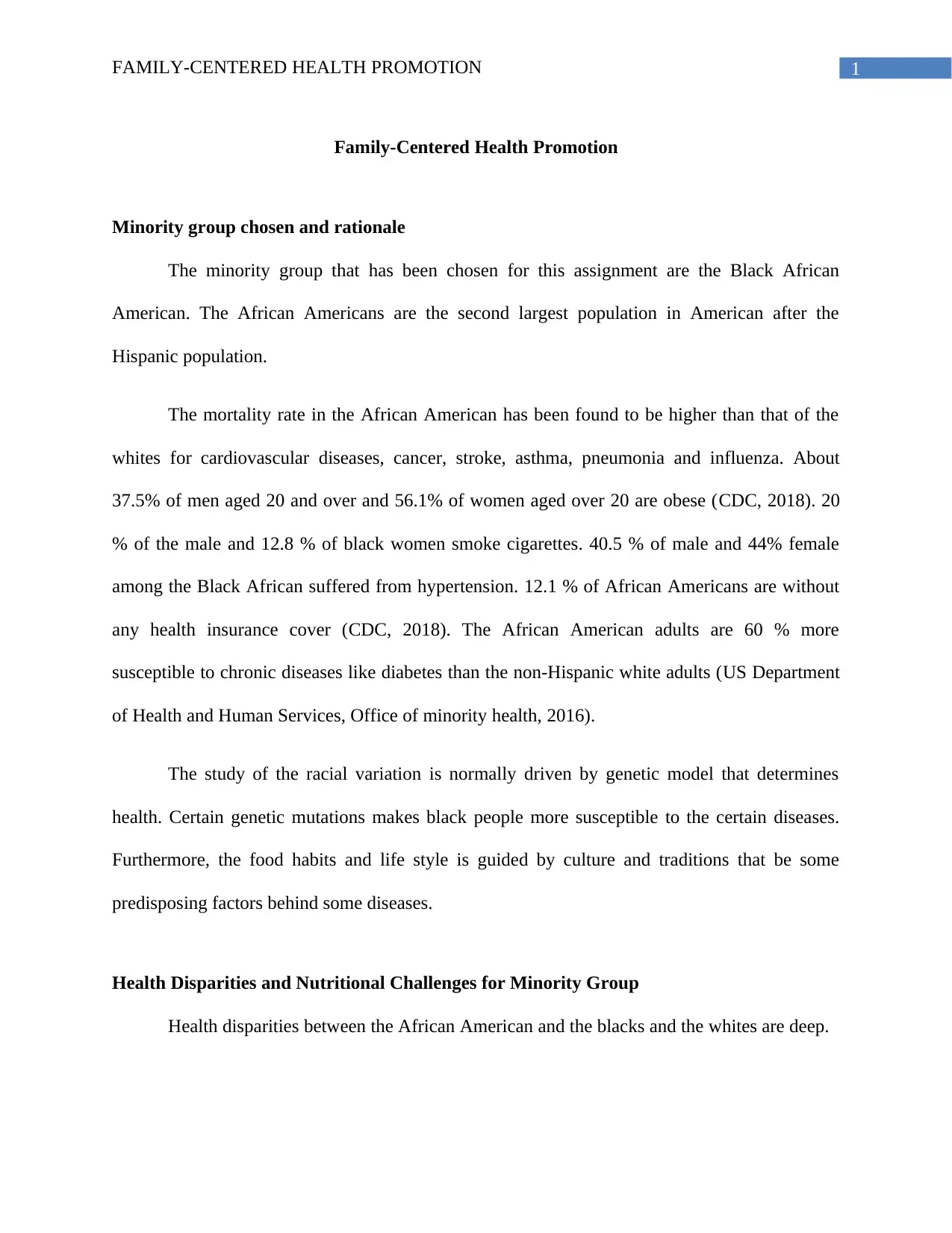
1FAMILY-CENTERED HEALTH PROMOTION
Family-Centered Health Promotion
Minority group chosen and rationale
The minority group that has been chosen for this assignment are the Black African
American. The African Americans are the second largest population in American after the
Hispanic population.
The mortality rate in the African American has been found to be higher than that of the
whites for cardiovascular diseases, cancer, stroke, asthma, pneumonia and influenza. About
37.5% of men aged 20 and over and 56.1% of women aged over 20 are obese (CDC, 2018). 20
% of the male and 12.8 % of black women smoke cigarettes. 40.5 % of male and 44% female
among the Black African suffered from hypertension. 12.1 % of African Americans are without
any health insurance cover (CDC, 2018). The African American adults are 60 % more
susceptible to chronic diseases like diabetes than the non-Hispanic white adults (US Department
of Health and Human Services, Office of minority health, 2016).
The study of the racial variation is normally driven by genetic model that determines
health. Certain genetic mutations makes black people more susceptible to the certain diseases.
Furthermore, the food habits and life style is guided by culture and traditions that be some
predisposing factors behind some diseases.
Health Disparities and Nutritional Challenges for Minority Group
Health disparities between the African American and the blacks and the whites are deep.
Family-Centered Health Promotion
Minority group chosen and rationale
The minority group that has been chosen for this assignment are the Black African
American. The African Americans are the second largest population in American after the
Hispanic population.
The mortality rate in the African American has been found to be higher than that of the
whites for cardiovascular diseases, cancer, stroke, asthma, pneumonia and influenza. About
37.5% of men aged 20 and over and 56.1% of women aged over 20 are obese (CDC, 2018). 20
% of the male and 12.8 % of black women smoke cigarettes. 40.5 % of male and 44% female
among the Black African suffered from hypertension. 12.1 % of African Americans are without
any health insurance cover (CDC, 2018). The African American adults are 60 % more
susceptible to chronic diseases like diabetes than the non-Hispanic white adults (US Department
of Health and Human Services, Office of minority health, 2016).
The study of the racial variation is normally driven by genetic model that determines
health. Certain genetic mutations makes black people more susceptible to the certain diseases.
Furthermore, the food habits and life style is guided by culture and traditions that be some
predisposing factors behind some diseases.
Health Disparities and Nutritional Challenges for Minority Group
Health disparities between the African American and the blacks and the whites are deep.
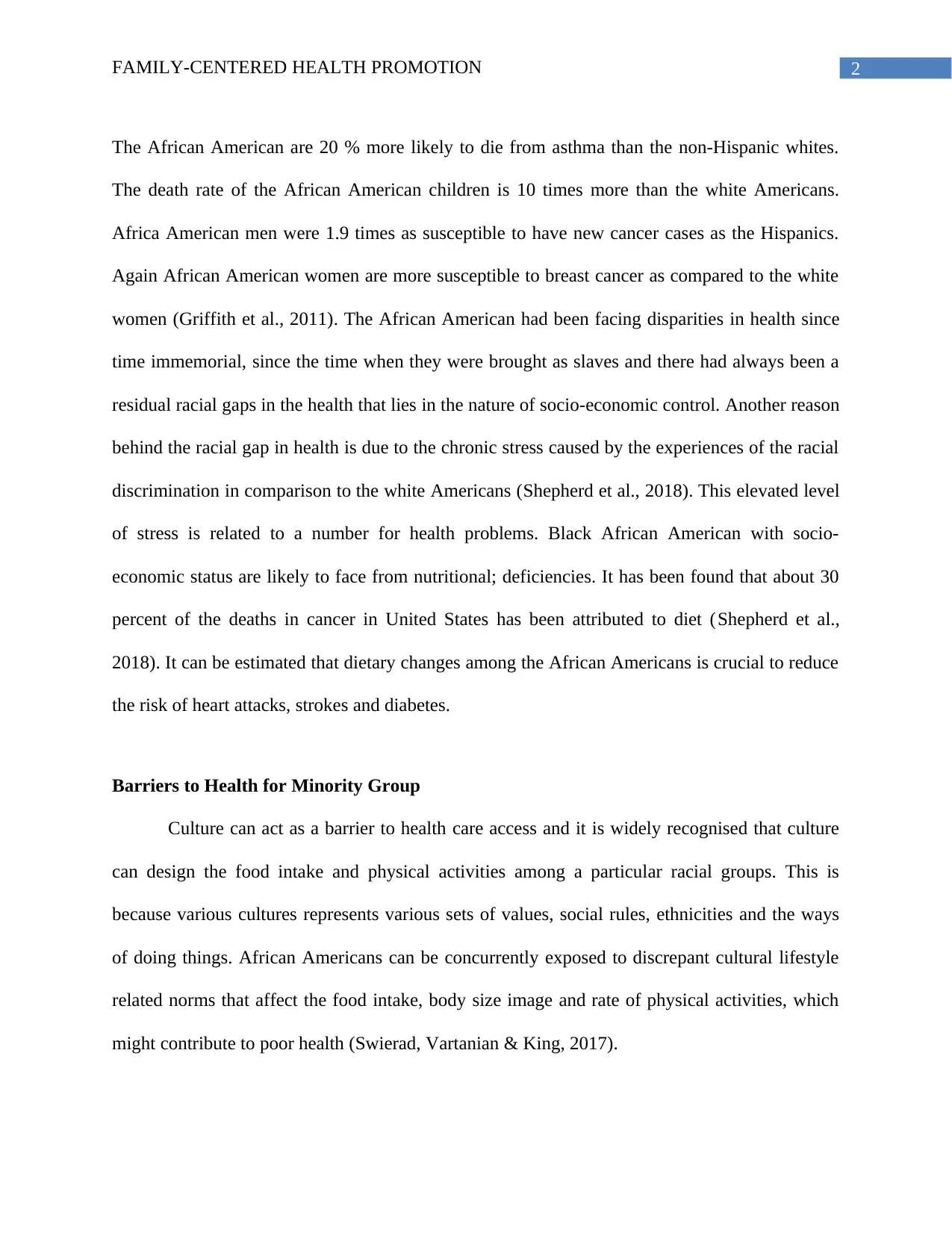
2FAMILY-CENTERED HEALTH PROMOTION
The African American are 20 % more likely to die from asthma than the non-Hispanic whites.
The death rate of the African American children is 10 times more than the white Americans.
Africa American men were 1.9 times as susceptible to have new cancer cases as the Hispanics.
Again African American women are more susceptible to breast cancer as compared to the white
women (Griffith et al., 2011). The African American had been facing disparities in health since
time immemorial, since the time when they were brought as slaves and there had always been a
residual racial gaps in the health that lies in the nature of socio-economic control. Another reason
behind the racial gap in health is due to the chronic stress caused by the experiences of the racial
discrimination in comparison to the white Americans (Shepherd et al., 2018). This elevated level
of stress is related to a number for health problems. Black African American with socio-
economic status are likely to face from nutritional; deficiencies. It has been found that about 30
percent of the deaths in cancer in United States has been attributed to diet (Shepherd et al.,
2018). It can be estimated that dietary changes among the African Americans is crucial to reduce
the risk of heart attacks, strokes and diabetes.
Barriers to Health for Minority Group
Culture can act as a barrier to health care access and it is widely recognised that culture
can design the food intake and physical activities among a particular racial groups. This is
because various cultures represents various sets of values, social rules, ethnicities and the ways
of doing things. African Americans can be concurrently exposed to discrepant cultural lifestyle
related norms that affect the food intake, body size image and rate of physical activities, which
might contribute to poor health (Swierad, Vartanian & King, 2017).
The African American are 20 % more likely to die from asthma than the non-Hispanic whites.
The death rate of the African American children is 10 times more than the white Americans.
Africa American men were 1.9 times as susceptible to have new cancer cases as the Hispanics.
Again African American women are more susceptible to breast cancer as compared to the white
women (Griffith et al., 2011). The African American had been facing disparities in health since
time immemorial, since the time when they were brought as slaves and there had always been a
residual racial gaps in the health that lies in the nature of socio-economic control. Another reason
behind the racial gap in health is due to the chronic stress caused by the experiences of the racial
discrimination in comparison to the white Americans (Shepherd et al., 2018). This elevated level
of stress is related to a number for health problems. Black African American with socio-
economic status are likely to face from nutritional; deficiencies. It has been found that about 30
percent of the deaths in cancer in United States has been attributed to diet (Shepherd et al.,
2018). It can be estimated that dietary changes among the African Americans is crucial to reduce
the risk of heart attacks, strokes and diabetes.
Barriers to Health for Minority Group
Culture can act as a barrier to health care access and it is widely recognised that culture
can design the food intake and physical activities among a particular racial groups. This is
because various cultures represents various sets of values, social rules, ethnicities and the ways
of doing things. African Americans can be concurrently exposed to discrepant cultural lifestyle
related norms that affect the food intake, body size image and rate of physical activities, which
might contribute to poor health (Swierad, Vartanian & King, 2017).
⊘ This is a preview!⊘
Do you want full access?
Subscribe today to unlock all pages.

Trusted by 1+ million students worldwide
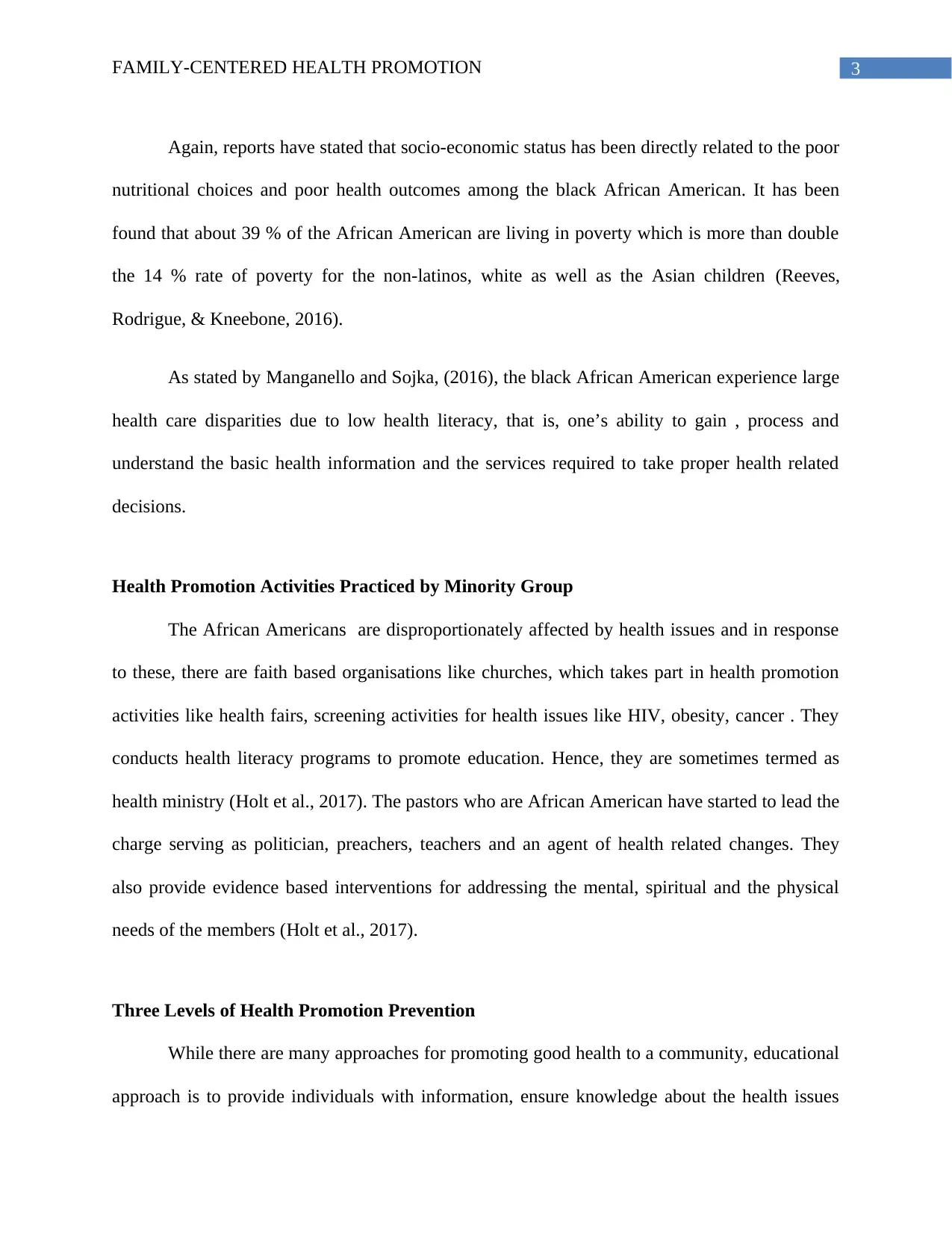
3FAMILY-CENTERED HEALTH PROMOTION
Again, reports have stated that socio-economic status has been directly related to the poor
nutritional choices and poor health outcomes among the black African American. It has been
found that about 39 % of the African American are living in poverty which is more than double
the 14 % rate of poverty for the non-latinos, white as well as the Asian children (Reeves,
Rodrigue, & Kneebone, 2016).
As stated by Manganello and Sojka, (2016), the black African American experience large
health care disparities due to low health literacy, that is, one’s ability to gain , process and
understand the basic health information and the services required to take proper health related
decisions.
Health Promotion Activities Practiced by Minority Group
The African Americans are disproportionately affected by health issues and in response
to these, there are faith based organisations like churches, which takes part in health promotion
activities like health fairs, screening activities for health issues like HIV, obesity, cancer . They
conducts health literacy programs to promote education. Hence, they are sometimes termed as
health ministry (Holt et al., 2017). The pastors who are African American have started to lead the
charge serving as politician, preachers, teachers and an agent of health related changes. They
also provide evidence based interventions for addressing the mental, spiritual and the physical
needs of the members (Holt et al., 2017).
Three Levels of Health Promotion Prevention
While there are many approaches for promoting good health to a community, educational
approach is to provide individuals with information, ensure knowledge about the health issues
Again, reports have stated that socio-economic status has been directly related to the poor
nutritional choices and poor health outcomes among the black African American. It has been
found that about 39 % of the African American are living in poverty which is more than double
the 14 % rate of poverty for the non-latinos, white as well as the Asian children (Reeves,
Rodrigue, & Kneebone, 2016).
As stated by Manganello and Sojka, (2016), the black African American experience large
health care disparities due to low health literacy, that is, one’s ability to gain , process and
understand the basic health information and the services required to take proper health related
decisions.
Health Promotion Activities Practiced by Minority Group
The African Americans are disproportionately affected by health issues and in response
to these, there are faith based organisations like churches, which takes part in health promotion
activities like health fairs, screening activities for health issues like HIV, obesity, cancer . They
conducts health literacy programs to promote education. Hence, they are sometimes termed as
health ministry (Holt et al., 2017). The pastors who are African American have started to lead the
charge serving as politician, preachers, teachers and an agent of health related changes. They
also provide evidence based interventions for addressing the mental, spiritual and the physical
needs of the members (Holt et al., 2017).
Three Levels of Health Promotion Prevention
While there are many approaches for promoting good health to a community, educational
approach is to provide individuals with information, ensure knowledge about the health issues
Paraphrase This Document
Need a fresh take? Get an instant paraphrase of this document with our AI Paraphraser
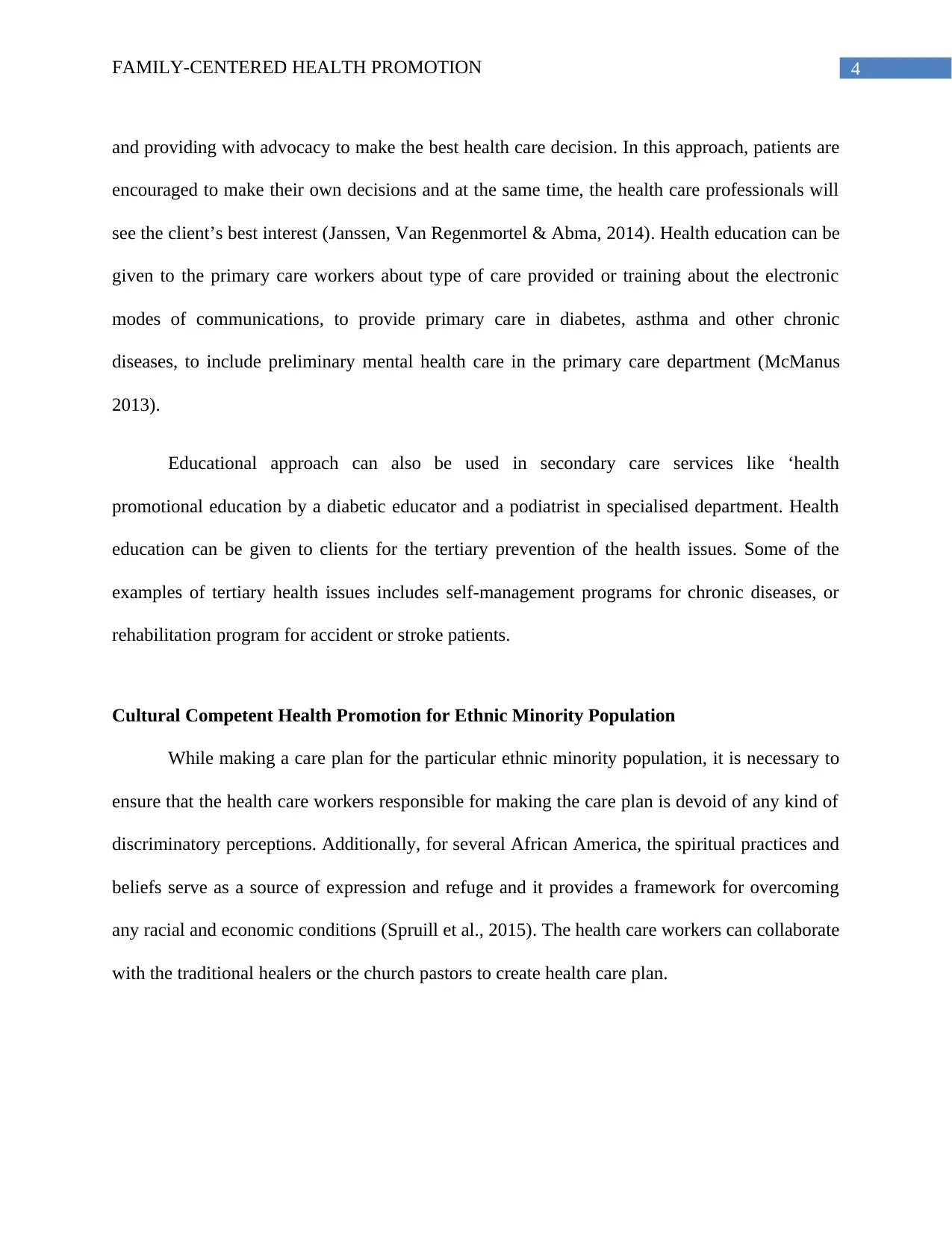
4FAMILY-CENTERED HEALTH PROMOTION
and providing with advocacy to make the best health care decision. In this approach, patients are
encouraged to make their own decisions and at the same time, the health care professionals will
see the client’s best interest (Janssen, Van Regenmortel & Abma, 2014). Health education can be
given to the primary care workers about type of care provided or training about the electronic
modes of communications, to provide primary care in diabetes, asthma and other chronic
diseases, to include preliminary mental health care in the primary care department (McManus
2013).
Educational approach can also be used in secondary care services like ‘health
promotional education by a diabetic educator and a podiatrist in specialised department. Health
education can be given to clients for the tertiary prevention of the health issues. Some of the
examples of tertiary health issues includes self-management programs for chronic diseases, or
rehabilitation program for accident or stroke patients.
Cultural Competent Health Promotion for Ethnic Minority Population
While making a care plan for the particular ethnic minority population, it is necessary to
ensure that the health care workers responsible for making the care plan is devoid of any kind of
discriminatory perceptions. Additionally, for several African America, the spiritual practices and
beliefs serve as a source of expression and refuge and it provides a framework for overcoming
any racial and economic conditions (Spruill et al., 2015). The health care workers can collaborate
with the traditional healers or the church pastors to create health care plan.
and providing with advocacy to make the best health care decision. In this approach, patients are
encouraged to make their own decisions and at the same time, the health care professionals will
see the client’s best interest (Janssen, Van Regenmortel & Abma, 2014). Health education can be
given to the primary care workers about type of care provided or training about the electronic
modes of communications, to provide primary care in diabetes, asthma and other chronic
diseases, to include preliminary mental health care in the primary care department (McManus
2013).
Educational approach can also be used in secondary care services like ‘health
promotional education by a diabetic educator and a podiatrist in specialised department. Health
education can be given to clients for the tertiary prevention of the health issues. Some of the
examples of tertiary health issues includes self-management programs for chronic diseases, or
rehabilitation program for accident or stroke patients.
Cultural Competent Health Promotion for Ethnic Minority Population
While making a care plan for the particular ethnic minority population, it is necessary to
ensure that the health care workers responsible for making the care plan is devoid of any kind of
discriminatory perceptions. Additionally, for several African America, the spiritual practices and
beliefs serve as a source of expression and refuge and it provides a framework for overcoming
any racial and economic conditions (Spruill et al., 2015). The health care workers can collaborate
with the traditional healers or the church pastors to create health care plan.
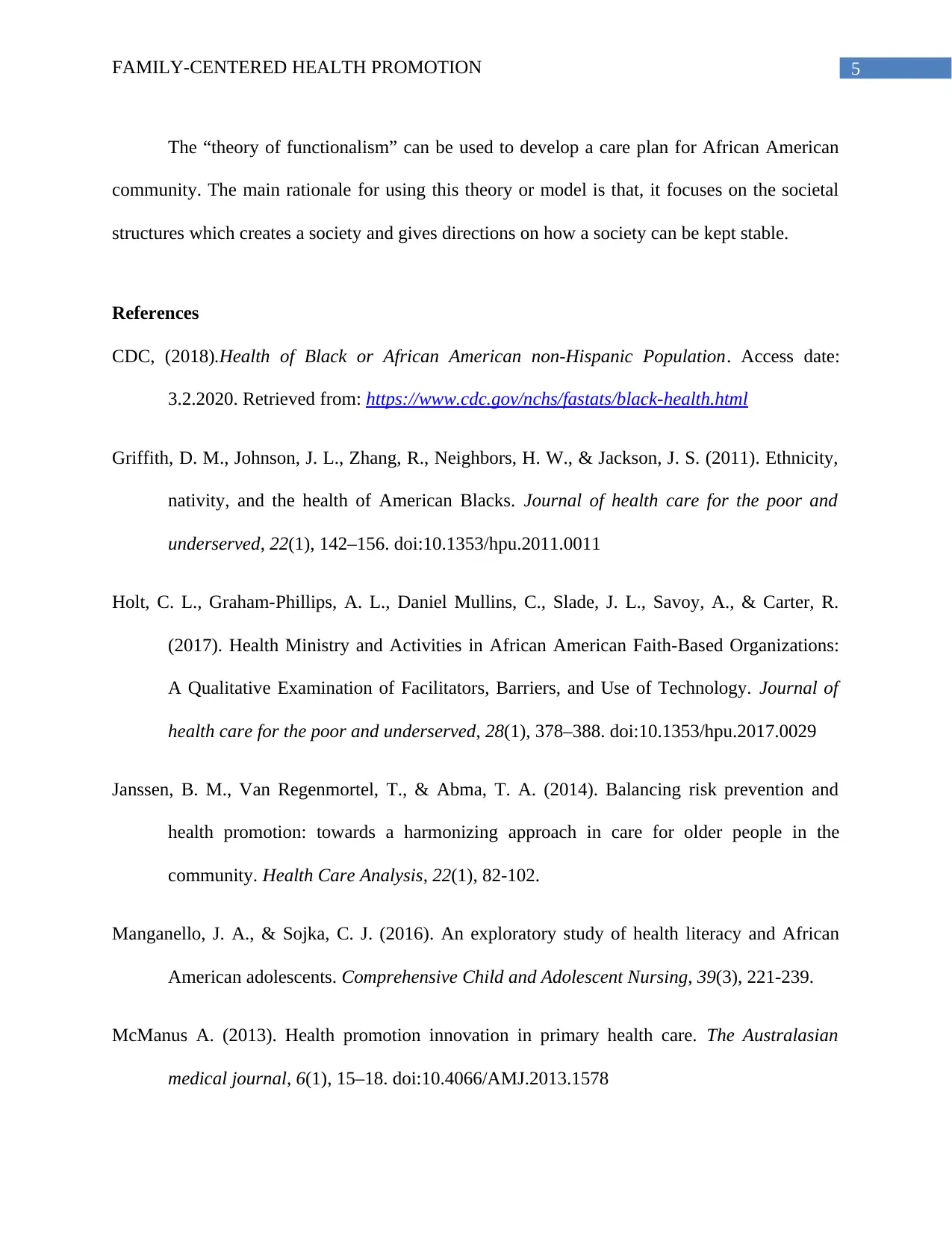
5FAMILY-CENTERED HEALTH PROMOTION
The “theory of functionalism” can be used to develop a care plan for African American
community. The main rationale for using this theory or model is that, it focuses on the societal
structures which creates a society and gives directions on how a society can be kept stable.
References
CDC, (2018).Health of Black or African American non-Hispanic Population. Access date:
3.2.2020. Retrieved from: https://www.cdc.gov/nchs/fastats/black-health.html
Griffith, D. M., Johnson, J. L., Zhang, R., Neighbors, H. W., & Jackson, J. S. (2011). Ethnicity,
nativity, and the health of American Blacks. Journal of health care for the poor and
underserved, 22(1), 142–156. doi:10.1353/hpu.2011.0011
Holt, C. L., Graham-Phillips, A. L., Daniel Mullins, C., Slade, J. L., Savoy, A., & Carter, R.
(2017). Health Ministry and Activities in African American Faith-Based Organizations:
A Qualitative Examination of Facilitators, Barriers, and Use of Technology. Journal of
health care for the poor and underserved, 28(1), 378–388. doi:10.1353/hpu.2017.0029
Janssen, B. M., Van Regenmortel, T., & Abma, T. A. (2014). Balancing risk prevention and
health promotion: towards a harmonizing approach in care for older people in the
community. Health Care Analysis, 22(1), 82-102.
Manganello, J. A., & Sojka, C. J. (2016). An exploratory study of health literacy and African
American adolescents. Comprehensive Child and Adolescent Nursing, 39(3), 221-239.
McManus A. (2013). Health promotion innovation in primary health care. The Australasian
medical journal, 6(1), 15–18. doi:10.4066/AMJ.2013.1578
The “theory of functionalism” can be used to develop a care plan for African American
community. The main rationale for using this theory or model is that, it focuses on the societal
structures which creates a society and gives directions on how a society can be kept stable.
References
CDC, (2018).Health of Black or African American non-Hispanic Population. Access date:
3.2.2020. Retrieved from: https://www.cdc.gov/nchs/fastats/black-health.html
Griffith, D. M., Johnson, J. L., Zhang, R., Neighbors, H. W., & Jackson, J. S. (2011). Ethnicity,
nativity, and the health of American Blacks. Journal of health care for the poor and
underserved, 22(1), 142–156. doi:10.1353/hpu.2011.0011
Holt, C. L., Graham-Phillips, A. L., Daniel Mullins, C., Slade, J. L., Savoy, A., & Carter, R.
(2017). Health Ministry and Activities in African American Faith-Based Organizations:
A Qualitative Examination of Facilitators, Barriers, and Use of Technology. Journal of
health care for the poor and underserved, 28(1), 378–388. doi:10.1353/hpu.2017.0029
Janssen, B. M., Van Regenmortel, T., & Abma, T. A. (2014). Balancing risk prevention and
health promotion: towards a harmonizing approach in care for older people in the
community. Health Care Analysis, 22(1), 82-102.
Manganello, J. A., & Sojka, C. J. (2016). An exploratory study of health literacy and African
American adolescents. Comprehensive Child and Adolescent Nursing, 39(3), 221-239.
McManus A. (2013). Health promotion innovation in primary health care. The Australasian
medical journal, 6(1), 15–18. doi:10.4066/AMJ.2013.1578
⊘ This is a preview!⊘
Do you want full access?
Subscribe today to unlock all pages.

Trusted by 1+ million students worldwide
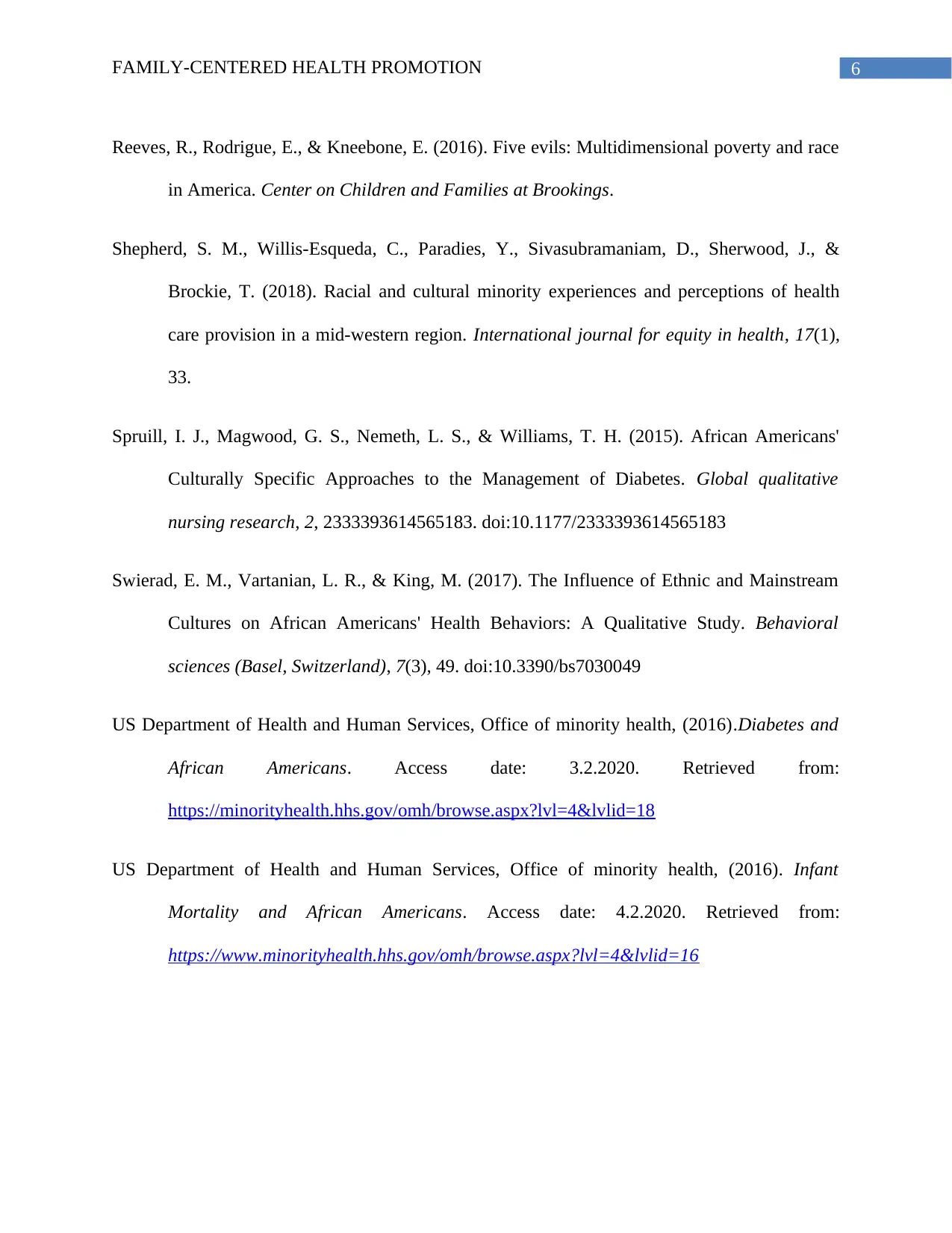
6FAMILY-CENTERED HEALTH PROMOTION
Reeves, R., Rodrigue, E., & Kneebone, E. (2016). Five evils: Multidimensional poverty and race
in America. Center on Children and Families at Brookings.
Shepherd, S. M., Willis-Esqueda, C., Paradies, Y., Sivasubramaniam, D., Sherwood, J., &
Brockie, T. (2018). Racial and cultural minority experiences and perceptions of health
care provision in a mid-western region. International journal for equity in health, 17(1),
33.
Spruill, I. J., Magwood, G. S., Nemeth, L. S., & Williams, T. H. (2015). African Americans'
Culturally Specific Approaches to the Management of Diabetes. Global qualitative
nursing research, 2, 2333393614565183. doi:10.1177/2333393614565183
Swierad, E. M., Vartanian, L. R., & King, M. (2017). The Influence of Ethnic and Mainstream
Cultures on African Americans' Health Behaviors: A Qualitative Study. Behavioral
sciences (Basel, Switzerland), 7(3), 49. doi:10.3390/bs7030049
US Department of Health and Human Services, Office of minority health, (2016).Diabetes and
African Americans. Access date: 3.2.2020. Retrieved from:
https://minorityhealth.hhs.gov/omh/browse.aspx?lvl=4&lvlid=18
US Department of Health and Human Services, Office of minority health, (2016). Infant
Mortality and African Americans. Access date: 4.2.2020. Retrieved from:
https://www.minorityhealth.hhs.gov/omh/browse.aspx?lvl=4&lvlid=16
Reeves, R., Rodrigue, E., & Kneebone, E. (2016). Five evils: Multidimensional poverty and race
in America. Center on Children and Families at Brookings.
Shepherd, S. M., Willis-Esqueda, C., Paradies, Y., Sivasubramaniam, D., Sherwood, J., &
Brockie, T. (2018). Racial and cultural minority experiences and perceptions of health
care provision in a mid-western region. International journal for equity in health, 17(1),
33.
Spruill, I. J., Magwood, G. S., Nemeth, L. S., & Williams, T. H. (2015). African Americans'
Culturally Specific Approaches to the Management of Diabetes. Global qualitative
nursing research, 2, 2333393614565183. doi:10.1177/2333393614565183
Swierad, E. M., Vartanian, L. R., & King, M. (2017). The Influence of Ethnic and Mainstream
Cultures on African Americans' Health Behaviors: A Qualitative Study. Behavioral
sciences (Basel, Switzerland), 7(3), 49. doi:10.3390/bs7030049
US Department of Health and Human Services, Office of minority health, (2016).Diabetes and
African Americans. Access date: 3.2.2020. Retrieved from:
https://minorityhealth.hhs.gov/omh/browse.aspx?lvl=4&lvlid=18
US Department of Health and Human Services, Office of minority health, (2016). Infant
Mortality and African Americans. Access date: 4.2.2020. Retrieved from:
https://www.minorityhealth.hhs.gov/omh/browse.aspx?lvl=4&lvlid=16
1 out of 7
Related Documents
Your All-in-One AI-Powered Toolkit for Academic Success.
+13062052269
info@desklib.com
Available 24*7 on WhatsApp / Email
![[object Object]](/_next/static/media/star-bottom.7253800d.svg)
Unlock your academic potential
Copyright © 2020–2025 A2Z Services. All Rights Reserved. Developed and managed by ZUCOL.





